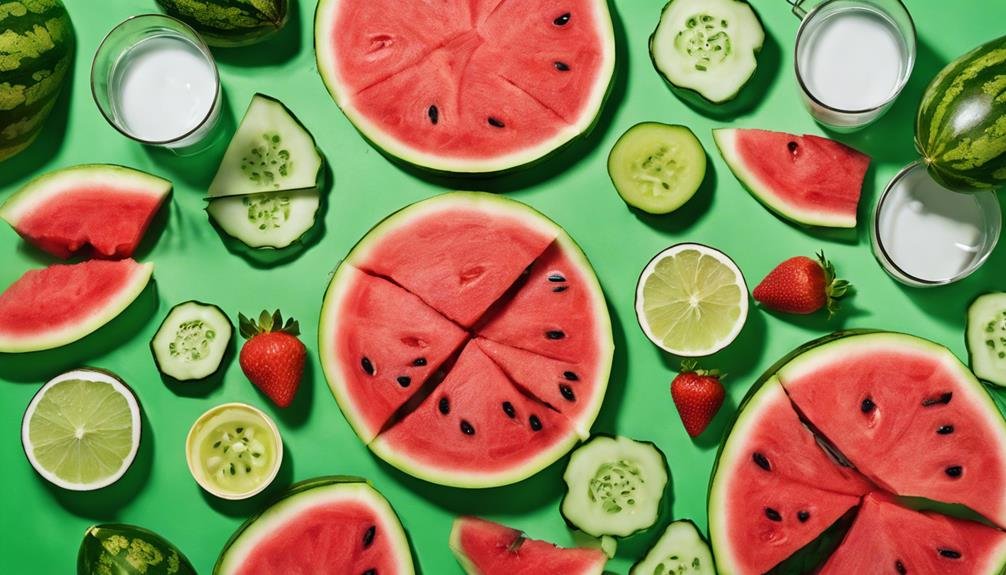Ensuring your skin stays hydrated is crucial, as studies show that hydrated skin can appear more plump and youthful. But did you know that simply drinking water might not be enough to maintain optimal skin hydration? There are various factors to consider when it comes to keeping your skin hydrated, including the products you use and the foods you consume. By understanding these key elements and implementing the right strategies, you can achieve that coveted healthy glow.
Importance of Hydration for Skin
Hydrating your skin is essential for maintaining its health and appearance. Your skin barrier, the outermost layer of your skin, acts as a protective shield against environmental stressors, bacteria, and moisture loss. Adequate hydration helps to strengthen this barrier, keeping your skin healthy and radiant.
Water intake plays a crucial role in skin hydration. When you're dehydrated, your skin is often one of the first organs to show signs of distress. Dehydration can lead to a compromised skin barrier, resulting in dryness, irritation, and even an increased risk of skin conditions such as eczema or psoriasis.
Choosing the Right Moisturizer
Selecting the appropriate moisturizer for your skin type is crucial in maintaining adequate hydration levels and promoting skin health. When choosing a moisturizer, consider ingredients that match your skin's needs. Below are some recommendations based on different skin types:
| Skin Type | Moisturizer Ingredients |
|---|---|
| Dry | Hyaluronic Acid, Glycerin, Shea Butter |
| Oily | Lightweight, Oil-free, Salicylic Acid |
| Combination | Aloe Vera, Niacinamide, Squalane |
For dry skin, ingredients like Hyaluronic Acid, Glycerin, and Shea Butter can provide deep hydration. Oily skin benefits from lightweight, oil-free moisturizers with ingredients like Salicylic Acid. Combination skin can benefit from moisturizers containing Aloe Vera, Niacinamide, and Squalane to balance hydration levels. Remember to patch test new products and adjust based on your skin's response. By choosing the right moisturizer with suitable ingredients, you can keep your skin hydrated, healthy, and glowing.
Hydrating Foods and Beverages
Nourishing your body with the right foods and beverages is key to maintaining optimal skin hydration levels and overall health. Hydrating smoothies packed with fruits like watermelon, cucumber, and berries are excellent choices to boost your skin's hydration. These fruits aren't only delicious but also rich in water content, vitamins, and antioxidants that promote skin health.
Additionally, incorporating skin-friendly teas like green tea or hibiscus tea into your daily routine can provide hydration and a dose of skin-loving nutrients.
Hydrating smoothies are a quick and convenient way to increase your daily water intake while also benefiting from the vitamins and minerals present in the fruits. Skin-friendly teas, on the other hand, offer hydration along with potential anti-inflammatory and antioxidant properties that can support skin health from the inside out.
Incorporating Hyaluronic Acid
To further maximize your skin's hydration and overall health, consider incorporating hyaluronic acid into your skincare routine. Hyaluronic acid benefits your skin by attracting and retaining moisture, helping to keep it plump, hydrated, and youthful-looking. This powerful ingredient is a humectant, meaning it draws moisture from the environment into your skin, providing a hydrating and plumping effect.
One effective way to incorporate hyaluronic acid into your routine is by using hyaluronic acid serums. These serums are lightweight, easily absorbed, and can be applied before your moisturizer to boost hydration. Look for serums with a high concentration of hyaluronic acid to experience maximum benefits.
When applying hyaluronic acid serums, ensure your skin is damp to help lock in moisture. Follow up with a moisturizer to seal in the hydration. By adding hyaluronic acid to your skincare regimen, you can enhance your skin's moisture levels and achieve a more radiant complexion.
Hydrating Skincare Routine
For optimal skin hydration and health, establishing a consistent hydrating skincare routine is essential. Your skin barrier, a crucial protective layer, plays a vital role in maintaining moisture balance.
To nurture your skin barrier and keep it healthy, incorporate hydrating products into your daily routine. Start with a gentle cleanser that doesn't strip away natural oils. Follow up with a hydrating toner to prep your skin for better absorption of subsequent products. Incorporating a serum containing hyaluronic acid can help replenish moisture and support your skin barrier. Finish with a rich moisturizer to lock in hydration and prevent water loss throughout the day.
Consistency is key when it comes to skincare routines. By nourishing your skin daily with hydrating products, you can support its natural moisture balance and promote a healthy skin barrier.
Remember to listen to your skin's needs and adjust your routine accordingly to keep it supple, hydrated, and glowing.
Frequently Asked Questions
Can Overhydration Lead to Skin Problems?
Overhydration can indeed lead to skin problems. When your hydration levels are excessive, it can disrupt the balance of essential nutrients in your skin, affecting its elasticity and potentially causing issues like puffiness and breakouts.
How Does Weather Affect Skin Hydration?
You might think that weather plays a minor role, but surprise! Humidity levels affect skin hydration significantly. Adjust your skincare routine accordingly. When it's dry, consider using hydrating products to combat moisture loss.
Is Drinking Water the Only Way to Hydrate Skin?
Drinking water is vital, but not the sole method. Proper skincare routines, like moisturizing and using hydrating serums, are key. Dietary changes can also impact skin hydration; consuming foods rich in omega-3s and antioxidants benefits your skin.
Can Stress Impact Skin Hydration Levels?
Stress, like a storm brewing within, can disrupt your skin's hydration. Hormonal imbalances and environmental factors triggered by stress may lead to dryness. Prioritize self-care, relaxation, and hydration to combat these effects and nurture your skin from within.
What Role Does Sleep Play in Skin Hydration?
Ensuring quality sleep is crucial for maintaining hydration balance in your skin. During deep sleep, your body repairs and regenerates skin cells, aiding in moisture retention. Lack of sleep can disrupt this process, leading to dull, dehydrated skin.
Conclusion
Now that you have the tools and knowledge to keep your skin hydrated, remember to stay consistent and make hydration a priority in your daily routine. By choosing the right moisturizer, incorporating hydrating foods and beverages, and following a hydrating skincare routine, you can achieve radiant and healthy skin. Remember, hydration is key to maintaining a glowing complexion, so keep up the great work and watch your skin thrive!





